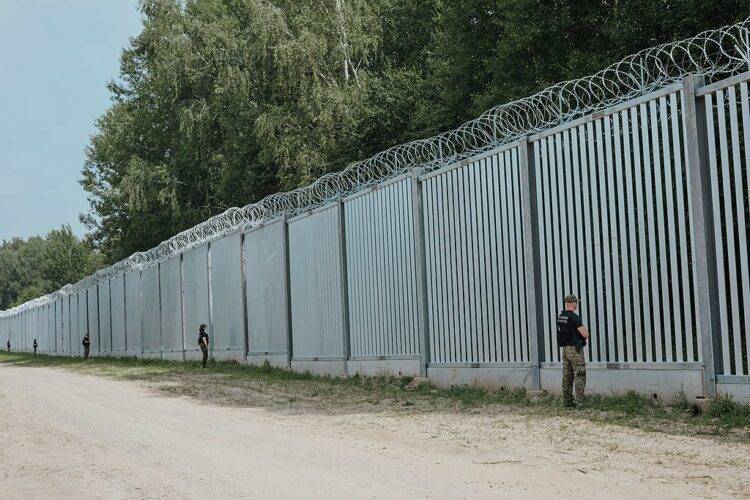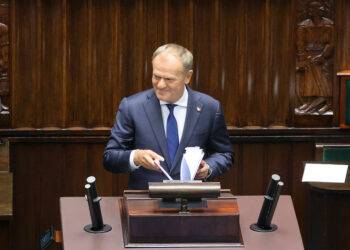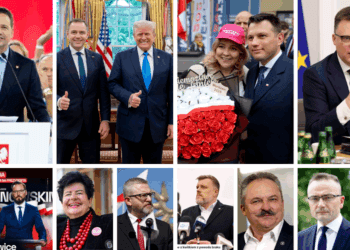Polish Defense Minister Władysław Kosiniak-Kamysz has strongly criticized filmmaker Agnieszka Holland over her recent remarks accusing Polish border forces of abusing migrants at the Poland-Belarus border. In a post shared on the social media platform X on Wednesday, Kosiniak-Kamysz defended the actions of Polish officers and denounced Holland’s statements as “scandalous and unacceptable.”
“Uniformed officers do not abuse anyone; they defend the border and ensure our safety. Ms. Holland’s statement undermines that safety.”, he wrote on Elon Musk’s platform.
Holland’s Allegations
Holland’s comments came during an appearance on Kanał Zero, where she accused Polish border forces of engaging in inhumane practices, including physical abuse, intimidation with dogs, and forcibly pushing migrants back into Belarus. She described these actions as violations of human rights and argued that they were neither humane nor ethical.
The filmmaker, known for her 2023 movie Green Border about the migrant crisis at the Poland-Belarus border, claimed her knowledge of these practices came from firsthand accounts and reports by non-governmental organizations. “This is not behavior that is humane or acceptable,” she said during the interview.
Agnieszka Holland also had difficult relationship with Poland’s former Law and Justice (PiS) government was, marked by intense hostility and public attacks.
The ultraconservative PiS party launched a vitriolic campaign against Holland following the release of her film Green Border, which depicted the plight of migrants at the Poland-Belarus border. Prominent PiS figures, including Justice Minister Zbigniew Ziobro, compared her work to Nazi propaganda, while party leader Jarosław Kaczyński labeled the film “shameful, repulsive, and disgusting.” President Andrzej Duda echoed these sentiments, calling the film “anti-Polish” and quoting slogans used during World War II to denounce Poles who watched Nazi propaganda.
The campaign against Holland extended beyond rhetoric; she faced threats severe enough to require private security during her visits to Poland. Despite this backlash, Green Border gained international acclaim, winning the Special Jury Prize at the Venice Film Festival and sparking debates about Poland’s migration policies and freedom of expression under PiS rule
Government Pushback
Kosiniak-Kamysz’s response reflects the government’s broader stance on migration and border security. His strongly worded post aligns with the government’s defense of its policies, which include strict measures to prevent illegal crossings and maintain national security. Officials have repeatedly argued that such policies are necessary to counter hybrid threats allegedly orchestrated by Belarus and Russia.
You may also be interested in
Poland Moves to Suspend Asylum Applications Amid Border Crisis
In a swift response to a surge in attempted border crossings, Poland’s government is set to suspend asylum applications, citing…
The defense minister also framed Holland’s accusations as harmful to public trust in Poland’s uniformed services. By suggesting that officers are mistreating migrants, he argued, Holland risks undermining their efforts to protect the country.
When Poland’s current ruling coalition, led by Donald Tusk and the Civic Coalition (KO), was in opposition during the Law and Justice (PiS) government, it was notably supportive of Agnieszka Holland’s criticisms of the treatment of migrants at the Polish-Belarusian border.
At the time, opposition leaders frequently condemned PiS’s strict pushback policies, accusing them of violating human rights, the Geneva Convention, and Poland’s Constitution. Figures within the coalition aligned themselves with activists and public figures, including Holland, who highlighted abuses at the border.
For instance, in 2021, Tusk and other opposition members criticized PiS for its dehumanizing approach to migration and its disregard for humanitarian principles. This stance starkly contrasts with their current position in government, where they have adopted a more security-focused narrative regarding border enforcement, drawing criticism for continuing some of the same policies they once opposed
A Polarizing Debate
Holland’s remarks have reignited a contentious debate in Poland over how to handle the ongoing migrant crisis. Since 2021, when Belarusian leader Alexander Lukashenko was accused of using migrants as part of a hybrid warfare strategy against the European Union, Poland has fortified its border with a steel barrier and implemented pushback policies. These measures have drawn criticism from human rights organizations but have been staunchly defended by Polish authorities.
Holland’s film Green Border brought international attention to the humanitarian crisis but faced harsh criticism from Polish officials. Justice Minister Zbigniew Ziobro previously compared her work to Nazi propaganda, while President Andrzej Duda called it “anti-Polish.” Kosiniak-Kamysz echoed these sentiments in his post, suggesting that such narratives damage Poland’s reputation and security.
Broader Implications
The exchange between Holland and Kosiniak-Kamysz underscores the deep divisions in Polish society over migration policy. While activists and human rights advocates call for more humane treatment of migrants, government officials argue that strict enforcement is essential to safeguard sovereignty and public safety.
Kosiniak-Kamysz’s comments highlight the government’s determination to defend its border policies against criticism from both domestic and international voices. As tensions persist at the Poland-Belarus border, this clash between security-focused governance and calls for humanitarian accountability continues to shape one of Europe’s most pressing political debates.


















